Faces of the City
Do informal settlements exist as a labour reserve at capital’s disposal or a bulwark against the capitalist economy?
By Hannah Dawson, Society, Work & Politics Institute, Wits
Time: 16:00-17:30 Venue: First Floor Seminar Room, John Moffat Building
Abstract: Do informal settlements exist as a labour reserve at capital’s disposal or a bulwark against the capitalist economy? My aim in asking the question in these terms is to contribute to contemporary discussions about how to theorise so-called ‘surplus populations’ and ‘urban slums’ that have long been presented as a dumping ground for those excluded from wage employment. The paper examines the ways in which the formal and informal sector articulate in uneven ways, reproducing and sharpening localised economic and social differences.
Biography: Hannah Dawson is an anthropologist with research interests in youth marginality and unemployment, inequality, the future of work, and new forms of social welfare in the Global South. She received her PhD in Anthropology from the University of Oxford in 2019, and is currently a post-doctoral fellow at the Society, Work & Politics Institute (SWOP) at the University of the Witwatersrand. She is working on a manuscript provisionally entitled “The productivity of unemployment: emerging forms of work and life in urban South Africa” which explores young people's everyday experiences of unemployment in South Africa, and the ways in which unemployment is actively shaping the form and texture of economic life, gender and family relations, and political expectations and demands in contemporary South Africa.
******************************************************************************************************
The Faces of the City seminar series is a partnership between the Centre for Urbanism and Built Environment Studies (CUBES) and the South African Research Chair in Spatial Analysis and City Planning (SA&CP) in the School of Architecture and Planning; the Gauteng City Region Observatory (GCRO); and the Wits City Institute (WCI).
The seminar series is an interdisciplinary forum focusing on all areas of urban interest. We welcome presentations from fields such as urban planning, architecture, sociology, geography, anthropology, environmental studies, and cultural studies. If you would like to motivate for a particular speaker or topic, email us on the rsvp email address below for consideration by the committee.
 Add event to calendar
Add event to calendar
Walter Hood: Recent Work
| When: |
Thursday, 13 February 2020 - Thursday, 13 February 2020 |
| Where: |
John Moffat LT
Braamfontein Campus East
A1 Lecture Theatre |
| Start time: | 17:30 |
| Enquiries: | Patricia.Theron@wits.ac.za |
The School of Architecture and Planning is pleased to invite you to a public talk by Walter Hood - landscape designer, artist, founder and creative director.
Walter Hood is the Creative Director and Founder of Hood Design Studio in Oakland, California.
Hood creates urban spaces that meld architectural and fine arts expertise with a commitment to designing ecologically sustainable public spaces that empower marginalized communities. Over his career, he has transformed traffic islands, vacant lots, and freeway underpasses into spaces that challenge the legacy of neglect of urban neighborhoods. Through engagement with community members, he teases out the natural and social histories as well as current residents’ shared patterns and practices of use and aspirations for a place.
Earlier notable design projects include: Lafayette Square Park (Oakland California, 1999), Splash Pad Park, gardens of the M.H. de Young Museum in Golden State Park (California, 2005), walkways of the Broad Museum in Los Angeles (2015) Broad Museum in Los Angeles (2015). More recently, Hood has undertaken ambitious commemorative landscapes that reflect his interest in the role of sculpture in public space, which includes plans for Nauck Town Square in Arlington County, Virginia (2016–present), located in a neighborhood whose residents are descendants of a pre-Emancipation community of freed blacks and the design for the landscape surrounding the forthcoming International African American Museum to be built on the site where nearly 40 percent of enslaved Africans arrived in the USA.
The Studio’s award-winning work has been featured in publications including Dwell, The Wall Street Journal, The New York Times, Fast Company, Architectural Digest, Places Journal, and Landscape Architecture Magazine. Walter Hood is. also a recipient of the 2017 Academy of Arts and Letters Architecture Award, 2019 Knight Foundation Public Spaces Fellowship, 2019 MacArthur Fellowship and 2019 Dorothy and Lillian Gish Prize.
Walter Hood Bio:
Walter Hood is the Creative Director and Founder of Hood Design Studio in Oakland, California. Hood Design Studio is a cultural practice, working across art, fabrication, design, landscape, research and urbanism. Walter Hood is the David K. Woo Chair and was the Professor of Landscape Architecture and Environmental Planning at the University of California, Berkeley. He is currently the Spring 2020 Diana Balmori Visiting Professor at the Yale School of Architecture. Walter Hood received a BLA (1981) from North Carolina A&T State University, an MLA and MArch (1989) from the University of California, Berkeley, and an MFA (2013) from the School of the Art Institute of Chicago. He has also published two monographs, Urban Diaries (1997) and Blues & Jazz Landscape Improvisations (1993), and is the editor of the forthcoming Black Landscapes Matter.

 Add event to calendar
Add event to calendar
InCommon: The Possibilities of Collective Space
| When: |
Thursday, 20 February 2020 |
| Where: |
John Moffat LT
Braamfontein Campus East |
| Start time: | 17:30 |
| Enquiries: | Patricia.Theron@wits.ac.za |
Lecture and Exhibition from Boogertman & Partners with Future Part
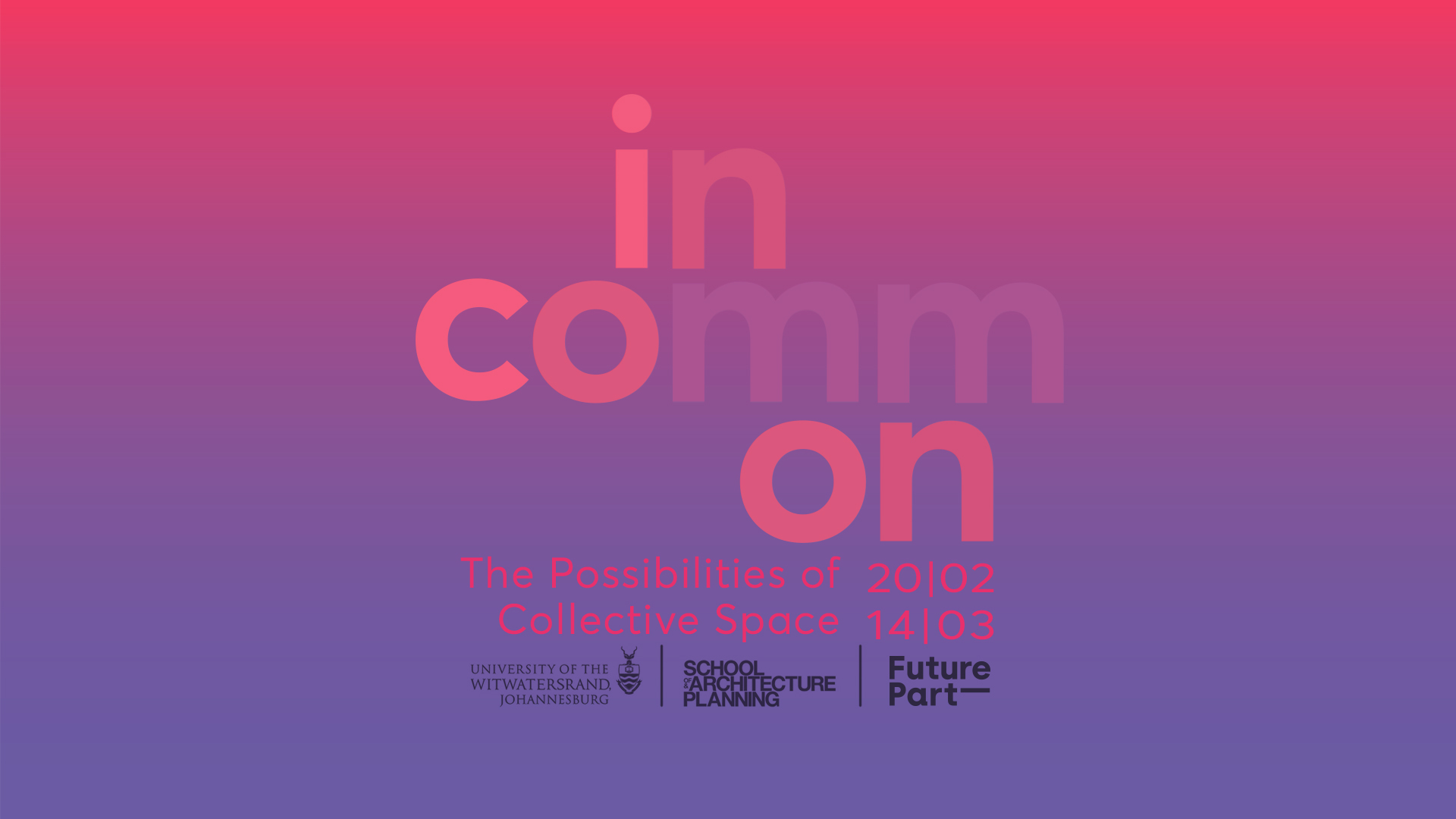
The School of Architecture and Planning invites you to 'InCommon: The Possibilities of Collective Space', presented by Bob van Bebber and Nisha van der Hoven: a lecture and exhibition from Boogertman & Partners with FuturePart. FuturePart is a collective agency for rigorous research and experimental design thinking, with a strong focus on process and digital technology.
Time: 17.30 for 18.00
Venue: Lecture to be held in the A1 Lecture Theatre, John Moffat Building (WITS East Campus), to be followed by a reception and opening of the exhibition in the John Moffat Foyer.
 Add event to calendar
Add event to calendar
Memorial Event for Herbert Prins
A memorial event will be held in memory of Herbert Prins, a distinguished architect and colleague.
Please join the event online on Zoom at the following link: https://zoom.us/j/94199908265
Time: 17.45 for 18.00
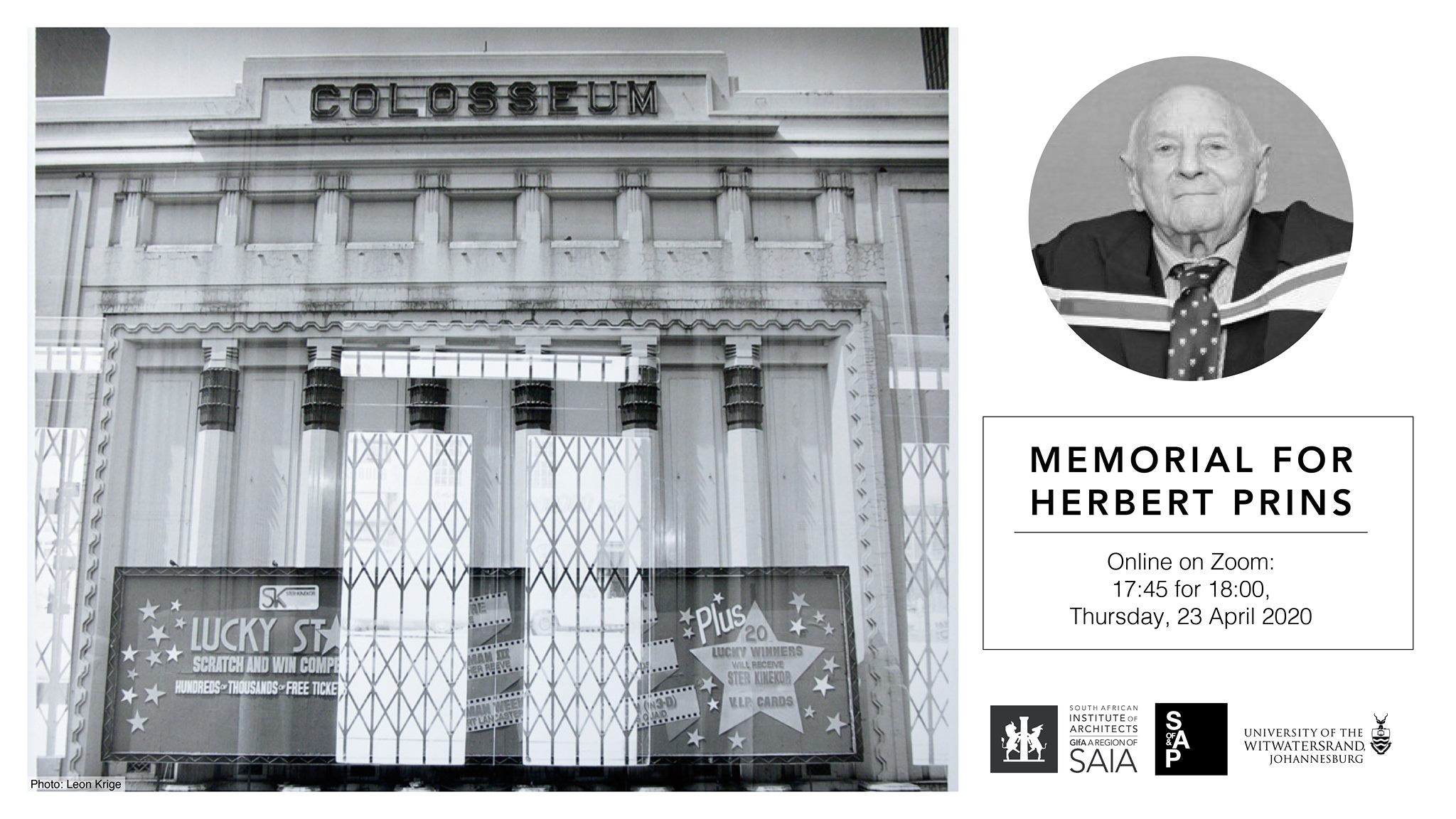
 Add event to calendar
Add event to calendar
Drawing Creepy Places
Dr Sechaba Maape will present this lecture, which forms part of the Global Studio Lecture Series
The Series is co-hosted by Open Architecture (South Africa) and the RAIC Centre for Architecture at Athabasca University (Canada). Please note this is a CPD event.
Time: 17.00-18.30 SA Time
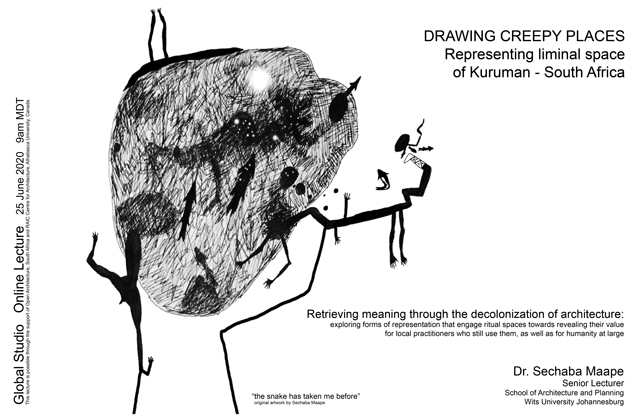
Sacred sites have been studied and discussed by scholars in the disciplines of architecture, anthropology and archaeology. Within these disciplines these spaces are typically represented using Western objective and scientific methods of representation including cut plans and sections, as well as laser scans. Using the case study of two ritual sites in the Kuruman area of the northern Cape province as case studies, the following paper will argue that modern methods of representation have the potential to strip away the value of these spaces for those who use them for their spiritual and ritual purposes. The paper will explore forms of representations that engage ritual spaces towards revealing their value for local practitioners who still use them, as well as humanity at large. The paper will discuss the significance of these places as liminal spaces through which humans gain the capacity to inhabit this earth. The paper will conclude by discussing the need for better understanding these spaces in relation to our contemporary global crises, and the role of representation of these spaces towards deeper forms of habitation.
Credits:
Participants who attend the full 90-minute session will be granted a Certificate of Completion to apply for professional development credits recognized by the following institutes.
- Alberta Association of Architects (AAA) | 1.5 Structured Learning Hour
- Ontario Association of Architects (OAA) | 1.5 Structured Learning Hour
- Cape Institute for Architecture (CIfA) | 0.25 Category 1 CPD Credits
- Gauteng Institute for Architecture (GIFA) | 0.25 Category 1 CPD Credits
- KwaZulu Natal Institute for Architecture (SAIA-KZN) | 0.25 Category 1 CPD Credits
 Add event to calendar
Add event to calendar
Italian Design Day, Lecture and Exhibition Opening
| When: |
Tuesday, 27 October 2020 - Tuesday, 27 October 2020 |
| Where: |
Online Event
|
| Start time: | 5:00 |
| Enquiries: | patricia.theron@wits.ac.za |
The Italian Design Day features events celebrating Italian design and its creativity and innovation potential in different fields (cultural and economic).
The Italian Design Day is an initiative promoted by the Italian Ministry of Foreign Affairs and International Cooperation, together with all the Italian Embassies, Consulates and Cultural Institutes around the world. The Italian Design Day features events celebrating Italian design and its creativity and innovation potential in different fields (cultural and economic).
The 4th edition this year is "Drawing the Future. Development, Innovation, Sustainability”.
In South Africa the Italian Cultural Institute, the University of the Witwatersrand and the Embassy of Italy will present the online exhibition and conference by Italian Architect, Irene Giglio, from Mario Cucinella Architects (MC A) titled “Architecture in the Time of Climate Change”.
lecture and Exhibition Opening
Tuesday 27 October 2020 | 17.00-18.30 | Online on MS TEAMS
This Event Carries 0.3 Category 1 CPD Points (SACAP)
For many, especially in the architectural community, the rapid spread of COVID-19 has caused them to reevaluate what it might mean to design for a world that will never be quite the same, especially when it comes to how we gather or use public spaces. If seen as a creative opportunity, together with other global challenges like climate change, this tremendous event can lead to a brand-new architectural language. MC A has been carrying out extensive research over the years, on the elements we can derive from our vernacular knowledge, and on the adaptive capacities of plants, able to create a deep empathy with their surroundings. The presented projects, selected from those located in Africa, are able to showcase this research and its variegated outcomes.
Irene Giglio is an experienced architect, specialised in integrated environmental design, after graduating with an M.Arch in Sustainable Environmental Design from the Architectural Association School of Architecture in London. She is International Account Manager at MC A (Mario Cucinella Architects), while she keeps returning to the AA as a lecturer and external reviewer. Registered as an architect in Italy, and member of the Architectural Association in the UK, Irene is also Visiting Professor in many national and international universities, while also giving a large number of lectures and conferences all around the world.
 Add event to calendar
Add event to calendar
'Build Your Own House’
Betty Spence’s Design-Research in 1950s South Africa
Coming up next week from the series co-supported by the Institute of Historical Research and organised in collaboration with the Oxford Architectural History Seminar.
Hannah Le Roux from the School of Architecture and Planning and Rixt Woudstra will discuss Betty Spence's practical instruction guide for black township inhabitants in Apartheid South Africa. Register for the seminar at the link: https://www.sahgb.org.uk/wha.../rixt-woudstra-hannah-le-roux
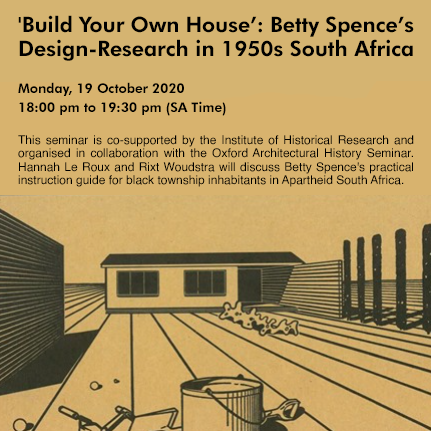
 Add event to calendar
Add event to calendar
South African Research Chair in Spatial Analysis and City Planning Book Launch
The SACP would like to invite you to the launch of two books, The Agonistic City and Densifying the City.
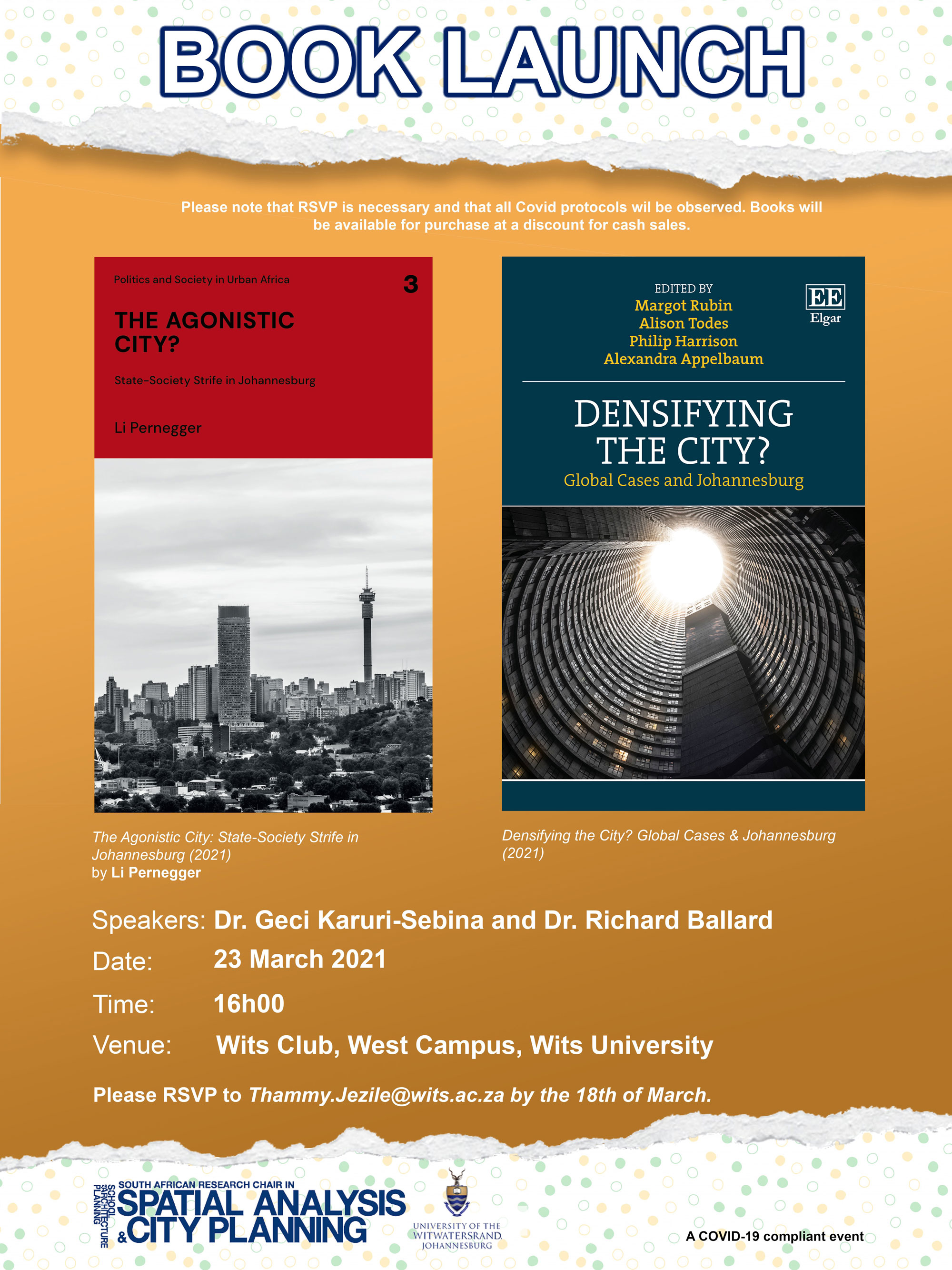
 Add event to calendar
Add event to calendar
Share
 Add event to calendar
Add event to calendar







